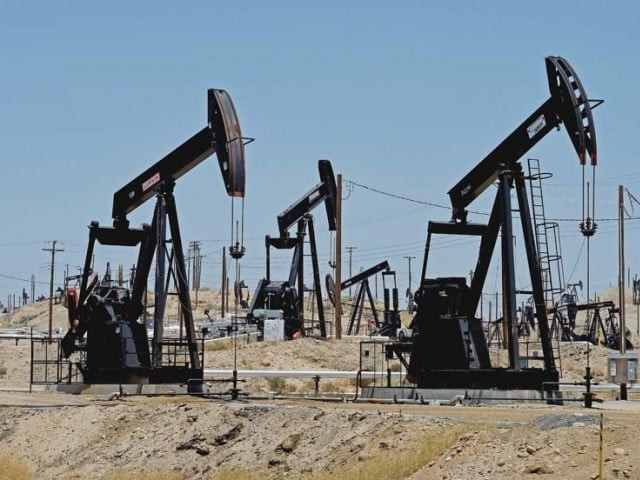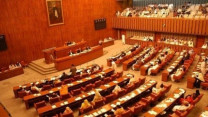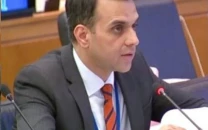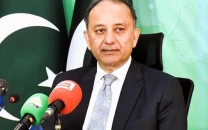Deregulation of petroleum industry recommended
Abbasi sees no quick fix to economic situation except for resolving energy crisis

Hydroelectric power and nuclear energy consumed time and money, but LNG power plants were easy to develop and by December 2017 most of the energy issues would be eliminated, said the petroleum minister. PHOTO: AFP
Experts of the oil and gas industry on Wednesday floated a set of recommendations including deregulation of the upstream and downstream industry for stimulating more investment and giving a fresh boost to the sector.
The proposals were given at the Pakistan Oil and Gas Conference, a flagship event of the Petroleum Institute of Pakistan, with the theme “Roadmap for a Sustainable Energy Future”.
Time is ripe for deregulating petroleum market, says Abbasi
The conference was attended by officials of government and private companies as well as overseas experts.
Adopting the recommendations, the conference emphasised the need for an integrated energy plan, regulatory reforms, extending the security measures taken for the China-Pakistan Economic Corridor (CPEC) to the oil and gas industry, shifting from RON 87 to 92 fuel specification, complying with Euro-II fuel standards, deregulating liquefied natural gas (LNG) imports, deregulating petroleum and freight margins, splitting gas companies into small distribution setups and fast-tracking LNG projects.
Petroleum and Natural Resources Minister Shahid Khaqan Abbasi, in his concluding remarks, cautioned there was no quick fix to the country’s economic situation except for resolving the energy crisis. “The only cost effective and quick solution is LNG import,” he said.
The minister pointed out that some energy experts were talking about cow dung or nuclear energy for easing power shortages, but “I must tell you that neither cow dung nor nuclear energy is the solution to the crisis”.
About 50% of Pakistan’s energy is based on gas, then comes oil, hydel and nuclear sources. Hydroelectric power and nuclear energy consumed time and money, but LNG power plants were easy to develop and by December 2017 most of the energy issues would be eliminated, he declared.
Pakistan's oil refineries continue to enjoy healthy margins
The LNG power plants were more efficient compared to oil-fired plants, which had efficiency of up to 40% whereas the former had an efficiency of 62%, he claimed. “It is a crime to run oil-based power plants,” he said, pointing out that after China, Pakistan was the second largest importer of furnace oil.
It was only after LNG import, according to the minister, the textile, fertiliser and CNG sectors had become operational. “Today, the fertiliser industry is considering exporting its products; it is real economics that on the one hand we are importing LNG and on the other we are exporting value-added products.”
With a huge demand for LNG, the government was supplying 2,600 million cubic feet per day, he said.
Earlier, Planning, Development and Reform Minister Ahsan Iqbal said under the CPEC, the country would have an energy corridor, in addition to the road network, which would cater to energy needs of the country. He revealed that petrochemical plants would be installed at Gwadar to meet the requirement of the entire region.
Centre to consult provinces on regulating LPG market
Talking about oil storages, Oil Companies Advisory Council CEO Ilyas Fazil said strategic reserves varied according to a government’s policy. EU member states are required to keep stocks for 90 days in order to avert a supply crisis. Germany also maintains 90 days of reserves through a federal body with representatives of refineries, oil marketing companies and government as its members.
In every case, the responsibility for keeping strategic stocks lay with the government along with the industry’s cooperating in implementing policy, he said.
He recalled that a study was conducted a few years ago that proposed keeping 45 days of strategic stocks across the country, but the recommendation was not adopted. “We propose that a working group be constituted by the petroleum ministry to assess the options for maintaining the strategic reserves.”
The CEO of Pakistan Petroleum Limited stressed that Pakistan must plan for a gas demand for 16 billion cubic feet per day. By 2040, he said, Pakistan would need to plan for a demand for 30 to 40 bcfd. “The biggest threat is not from outside the borders, but it is from within.”
Published in The Express Tribune, April 21st, 2016.
Like Business on Facebook, follow @TribuneBiz on Twitter to stay informed and join in the conversation.





1724926799-0/Untitled-design-(7)1724926799-0-208x130.webp)













COMMENTS
Comments are moderated and generally will be posted if they are on-topic and not abusive.
For more information, please see our Comments FAQ